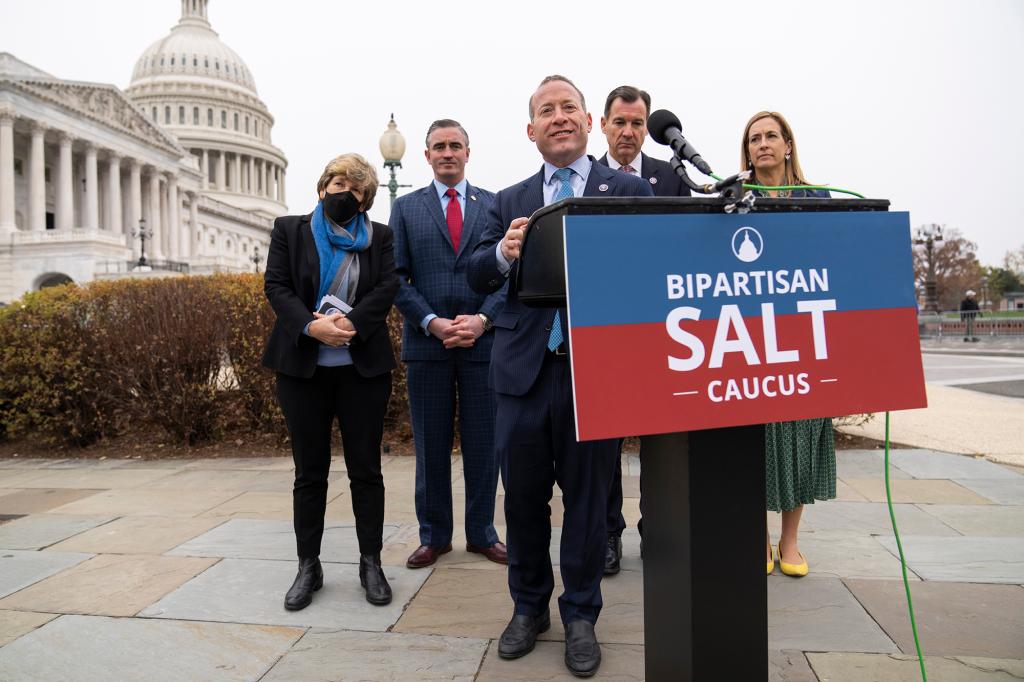They’re not SALT-y.
A trio of House Democrats from New York and New Jersey have said that they’ll support the massive spending plan their party forced through the Senate over the weekend — despite their earlier insistence that any such bill lift the cap on state and local tax (SALT ) deductions.
Rep. Tom Suozzi, Mikie Sherrill and Josh Gottheimer insisted that the $740 billion so-called Inflation Reduction Act would not raise taxes on individuals, despite a recent analysis by the Joint Committee on Taxation that found levies would jump by $16.7 billion on American taxpayers making less than $200,000 in 2023, while those who make between $200,000 and $500,000 would have to pay $14.1 billion more.
SALT deductions were limited to $10,000 as part of former President Donald Trump’s tax reform plan in 2017, hurting residents of high-tax states like New York and New Jersey.
Late last year, all three lawmakers insisted that President Biden’s multi-trillion-dollar Build Back Better package increase the SALT caps, with Suozzi embracing the mantra: “No SALT, no deal.
”The Long Island rep told The Post Monday that he would support the package “because it is good for my constituents, good for America, and great for the environment.”


“Regarding SALT, the Inflation Reduction Act does not increase personal income taxes and ‘No SALT, no deal’ does not apply,” Suozzi added. “If any change is proposed in the personal income tax rate, I will insist that we restore the State and Local Tax Deduction.”
“The bill is fully paid for, in part, with provisions that go after tax cheats. It will also help pay down the debt — a fiscally-responsible way to get inflation down,” Gottheimer said Sunday after Vice President Kamala Harris cast the tie-breaking vote in the Senate.
“As for SALT, my line in the sand remains the same. If someone tries to change the tax rates on families in my District, I will insist that we restore the State and Local Tax Deduction,” he continued. “This legislation doesn’t raise taxes on families in my District — it reduces the financial burden on them. For that reason, and for its strong support of the climate, lower prescription drug prices, and job creation, I’ll be voting for it.”

Sherrill also expressed her commitment to reforming SALT, but noted that “[b]Because this legislation does not raise taxes on families in my district, but in fact significantly lowers their costs, I will be voting for it.”
The measure passed by the Senate does out $369 billion on environmental programs, including tax credits for buyers of electric vehicles and rebates for low-income Americans to install renewable energy sources in their homes.
The legislation also includes provisions allowing Medicare to directly negotiate the prices of certain drugs and capping out-of-pocket costs at $2,000 annually. The bill also extends expiring Affordable Care Act subsidies through 2025, allowing people earning up to 150% of the federal poverty level to get health insurance for free.

A $35-per-month cap on what private insurers can charge out-of-pocket for insulin failed to survive the hours-long vote-a-rama that preceded the final vote, falling three “ayes” short of the 60 needed to make the legislation.
The House is expected to reconvene to debate and vote on the measure on Friday. It is expected to pass and be sent to Biden’s desk with all 210 of the chamber’s Republicans voting “nay.”
.
